
Saddam Hussein Abd al-Majid al-Tikriti was an Iraqi politician and revolutionary who served as the fifth president of Iraq from 1979 to 2003. He also served as prime minister of Iraq from 1979 to 1991 and later from 1994 to 2003. He was a leading member of the revolutionary Arab Socialist Ba'ath Party and later the Baghdad-based Ba'ath Party and its regional organization, the Iraqi Ba'ath Party, which espoused Ba'athism, a mix of Arab nationalism and Arab socialism.

Tariq Aziz was an Iraqi politician who served as Deputy Prime Minister, Minister of Foreign Affairs and a close advisor of President Saddam Hussein. Their association began in the 1950s when both were activists for the then-banned Arab Socialist Ba'ath Party. He was both an Arab nationalist and a member of the Chaldean Catholic Church.
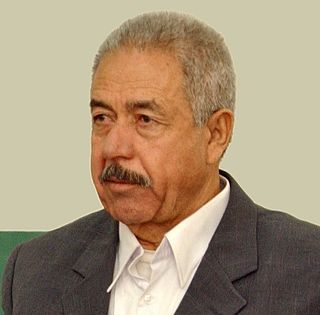
Ali Hassan Majid al-Tikriti, nicknamed Chemical Ali, was an Iraqi politician and military commander under Saddam Hussein who served as defence minister, interior minister, and chief of the Iraqi Intelligence Service. He was also the governor of Kuwait during much of the 1990–91 Gulf War.
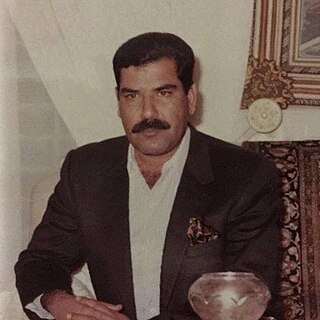
Watban Ibrahim al-Nasiri was an Iraqi politician and former Interior Minister of Iraq. He was the half-brother of Saddam Hussein and the brother of Barzan al-Tikriti. He was taken into coalition custody 13 April 2003, following his capture as he tried fleeing to Syria. He died in prison of natural causes in 2015.
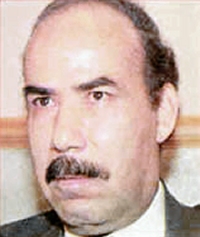
Barzan Ibrahim Hassan al-Tikriti, also known as Barazan Ibrahim al-Tikriti, Barasan Ibrahem Alhassen and Barzan Hassan, was one of three half-brothers of Saddam Hussein, and a leader of the Mukhabarat, the Iraqi intelligence service. Despite falling out of favour with Saddam at one time, he was believed to have been a close presidential adviser at the time of his capture by U.S. forces in 2003. On 15 January 2007, Barzan was hanged for crimes against humanity. He was decapitated by the hangman's rope after errors were made calculating his body weight and length of drop from the platform.

The Islamic Dawa Party, also known as the Islamic Call Party, is a Shia Islamist political party in Iraq. Dawa and the Supreme Islamic Iraqi Council are two of the main parties in the religious-Shiite United Iraqi Alliance, which won a plurality of seats in both the provisional January 2005 Iraqi election and the longer-term December 2005 election. The party is led by Haider al-Abadi, who was the Prime Minister of Iraq from 8 September 2014 to 25 October 2018. The party backed the Iranian Revolution and also Ayatollah Ruhollah Khomeini during the Iran–Iraq War and the group still receives financial support from Tehran despite ideological differences with the Islamic Republic. As of 2019, after two decades of political prominence and success, it is suffering from internal divisions and is in danger of losing its "political relevance".
The Iraqi High Tribunal (IHT), formerly the Iraqi Special Tribunal and sometimes referred to as the Supreme Iraqi Criminal Tribunal, is a body established under Iraqi national law to try Iraqi nationals or residents accused of genocide, crimes against humanity, war crimes or other serious crimes committed between 1968 and 2003. It organized the trial of Saddam Hussein and other members of his Ba'ath Party regime.

The Anfal campaign was a counterinsurgency operation which was carried out by Ba'athist Iraq from February to September 1988 during the Iraqi–Kurdish conflict at the end of the Iran–Iraq War. The campaign targeted rural Kurds because its purpose was to eliminate Kurdish rebel groups and Arabize strategic parts of the Kirkuk Governorate. The Iraqis committed atrocities on the local Kurdish population, mostly civilians.
Farzad Bazoft was an Iranian journalist who settled in the United Kingdom in the mid-1970s. He worked as a freelance reporter for The Observer. He was arrested by Iraqi authorities and executed in 1990 after being convicted of spying for Israel while working in Iraq.
Dujail is a town in Saladin Governorate, Iraq. It is situated about 65 kilometers (40 mi) north of Baghdad, and has approximately 100,000 inhabitants, who are mostly Shia. It was the site of the 1982 Dujail Massacre, in which between 142 and 148 people, including children, died. The 2008 Dujail bombing also took place here, and many bombings during the separate years and withstood during the terrorist attack of ISIS. It is famous for its palms and grapes, and it is considered a beautiful agricultural land.

The trial of Saddam Hussein was the trial of the deposed President of Iraq Saddam Hussein by the Iraqi Interim Government for crimes against humanity during his time in office.

Awad Hamad al-Bandar (Arabic: عواد حمد البندر السعدون, romanized: ʿAwād Ḥamad al-Bandar al-Saʿdūn; was an Iraqi chief judge under Saddam Hussein's presidency. He was a member of the Arab Socialist Ba'ath Party and was the head of the Revolutionary Court which issued death sentences against 143 Dujail residents, in the aftermath of the failed assassination attempt on the president on 8 July 1982.
Mizhar Abdullah Ruaid is a former Arab Socialist Ba'ath Party official in the Dujail region of Iraq, and the son of Abdullah Kadhem Ruaid. He was arrested in 2005 by US Forces while still living in Dujail. The arresting unit was the A/1-128 Infantry of the Wisconsin Army National Guard. He was convicted of involvement in the killings of 148 Shia Muslims during the Al-Dujail trial of Saddam Hussein, and was sentenced to 15 years in prison for aiding and abetting crimes against humanity. Ruaid has since completed his sentence.
Abdullah Kadhem Ruaid was a former Arab Socialist Ba'ath Party official in the Dujail region of Iraq and the father of Mizher Abdullah Roweed Al-Musheikhi. He was arrested in 2005 by A/1-128 of the Wisconsin Army National Guard. Ruaid was convicted of involvement in the killings of 148 Shia Muslims during the Al-Dujail trial of Saddam Hussein, and sentenced to 15 years in prison for aiding and abetting crimes against humanity.

Rauf Rashid Abd al-Rahman is the replacement chief judge of the Al-Dujail trial of Saddam Hussein in 2006, when he sentenced Saddam and some of his top aides to death by hanging.
Capital punishment in Iraq is a legal penalty. It was commonly used by the government of Saddam Hussein, was temporarily halted after the US-led 2003 invasion of Iraq that deposed Hussein, and has since been reinstated. Executions are carried out by hanging.
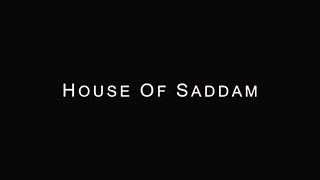
House of Saddam is a 2008 British docudrama television miniseries that charted the rise and fall of Saddam Hussein. A co-production between BBC Television and HBO Films, the series was first broadcast on BBC Two in four parts between 30 July and 20 August 2008.
Reactions to the execution of Saddam Hussein were varied. Some strongly supported the execution, particularly those personally affected by Saddam's actions as leader. Some of these victims wished to see him brought to trial for his other actions, alleged to have resulted in a much greater number of deaths than those for which he was convicted. Some believed the execution would boost morale in Iraq, while others feared it would incite further violence. Many in the international community supported Saddam being brought to justice but objected in particular to the use of capital punishment. Saddam's supporters condemned the action as unjust.
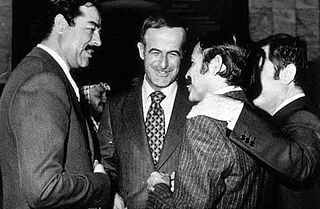
The 1979 Ba'ath Party Purge `, also called the Comrades Massacre, was a public purge of the Iraqi Ba'ath Party orchestrated on 22 July 1979 by then-president Saddam Hussein six days after his arrival to the presidency of the Iraqi Republic on 16 July 1979.












